#and like... i'm a low support needs autistic as well
Explore tagged Tumblr posts
Text
yknow i'm starting to understand why high support needs autistics complain so fucking much about low support needs folks
there's no fucking difference between them and NTs when it comes to actually accommodating you. like even the leftie commie poly queer ones. god forbid you have hearing issues or need to know things in advance or have trouble getting the train. if you can't socialise then you should just go fuck yourself, because the social autistics do not give a fuck about you.
#fucking exhausting#when i spend so much time trying to be nice to friends#and be accommodating#andnot let my rage get the better of me#and they can't even be fucking bothered to let me know plans a day in advance#like. y'all are just like NTs.#and like... i'm a low support needs autistic as well#but it still feels like there's a mile of difference between me and all the autistics i know#who seem like they can just. live. normally. have friends and party and have careers and shit#i'm so tired of being excluded from my own fucking community#just because people can't be bothered to actually listen to me#i mean i've always understood the complaints tbf#they're important#but i'm starting to realise how much i relate to them#and also maybe debating a little bit exactly how 'low support needs' i actually am#void.txt
0 notes
Text
low functioning means you are incapable of basic activities of daily living (bADLs) such as:
bathing or showering, dressing, getting in and out of bed or a chair, walking, using the toilet, continence (which sometimes gets excluded) and eating.
I understand that people feel like high functioning hand waves away their struggles with employment or depression or burn out or sensory processing or learning disabilities but high functioning as a label wasn't meant to address that. It was meant to address what's listed above. If you are mostly capable of a good portion of these tasks then you are probably high functioning. I know it's not exactly comforting to hear but no matter how many times you change the labels to 'low support' or 'level one' and idk what else we will come up with people will still erase our struggles but I'd rather have someone assume 'high functioning means that girl doesn't need help' than have people like my uncle not have a label like low functioning that tells people he needs help.
Quick side note: Also notice on that list of basic ADLs things like verbality aren't listed? Nonverbal doesn't automatically mean incapable of bADLs it means non speaking! Many nonverbal are very capable of independence and deserve to use swear words on their AAC devices if they express the desire to!
But yeah you might think high functioning erases your issues but the labels aren't focused on things like employment or driving skills or grocery shopping. They're focused on your ability to dress yourself without wearing your clothes the wrong way because you were confused or because you can't figure out how to put on an outfit or find your clothes.
If anyone here honestly holds the belief low functioning people have it easier then you need to wake the fuck up
my fellow low support needs/"high functioning"/level 1 autistics, please stop treating support needs labels like a personal attack on your struggles.
low support needs doesn't mean no support needs. low support needs doesn't mean you don't struggle. low support needs doesn't mean you can't be disabled by your autism. low support needs doesn't mean you can't have speech difficulties or severe sensory issues or bad symptom days.
all that low support needs/level 1 means is that you can usually complete activities of daily living with minimal assistance. [pt: on average, you have relatively lower support needs than some other autistic people.]
i know sometimes it may seem like these labels are erasing your struggles, i used to feel the same way. but the reality is that medium and high support needs autistics feel a lot worse when we keep calling these labels "unnecessary" but excluding the people who most need them from the conversation entirely.
#actually autistic#autism#high functioning autism#level 1 autism#lsn autism#low support needs autism#aspie#late diagnosed autistic#aspergers#(i don't like functioning labels or aspergers/aspie but i'm using them to reach my target audience)#This tag and the tags underneath are Phantombunker's not asters#Low functioning autism exists#Maybe the labels should be changed but low support needs/level one still ends up making it sound like we don't struggle#But getting rid of the labels is a bad idea!#Some people really need them!#Functioning labels aren't meant to capture all the struggles a disabled person might face#They're meant to gauge who will need the most attention inorder to survive#They don't capture being incapable of holding down a job or having no friends#But at the same time#Most high functioning people (emphasis on most not all) when given proper help can indeed do most things#Meanwhile low functioning people even with a ton of help might very well still need 24/7 care or more extreme assistance#And that's okay! But they're absolutely has to a be a label#Autism is sometimes a guy with dyslexia and sensory issues who still lives with his parents but won't die if expected to take care of --#--himself for a week#But autism can also be a man who can't bathe alone because he'll either drown himself or boil himself alive because he doesn't know any--#--better and he can't be left alone for too long because he won't eat or use the bathroom or dress himself without help#So we need a label to differentiate the levels of struggle
91 notes
·
View notes
Text
The autism representation in Splatoon needs to be studied and celebrated because oh my god it's actually really damn good and some of the best in media, especially compared to how its usually portrayed in popular media....
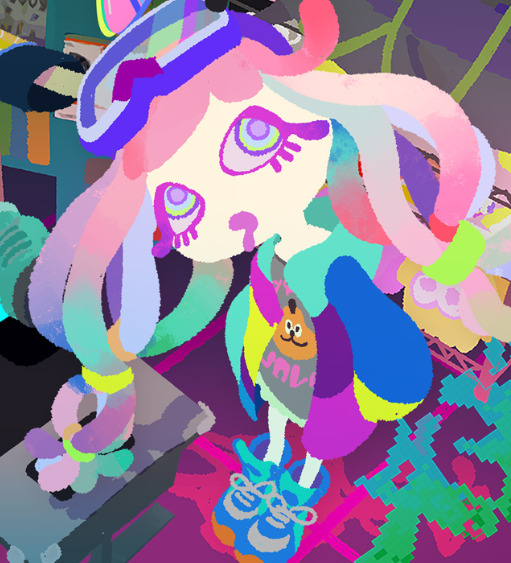
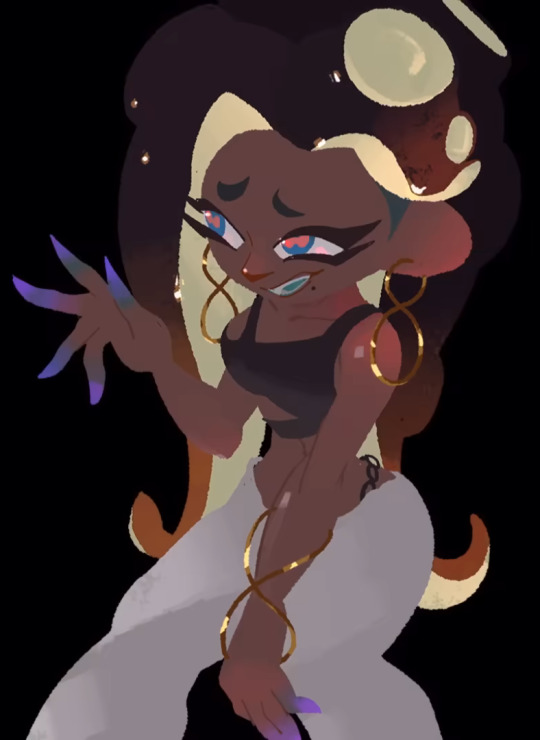
As someone who is on the spectrum and has been diagnosed, it's really comforting to know that one of my favorite game series has such positive depictions of autism and isn't just stereotypical depictions we commonly see in media.
Autism in most media is either portrayed as white nerdy dudes who are cold robots that have super intelligence, can understand alien languages and see the world like they are a fucking Lego master builder or some shit and see blueprints in the sky like in The Good Doctor or The Big Bang Theory with Sheldon. Or it's portrayed as people who are incredibly disabled, cannot communicate and have constant tantrums as seen with the dogshit movie Music (2021). Literally the depiction of autism in that movie is actually fucking dangerous as it shows a person pushing an autistic person who is having a meltdown onto the ground and RESTRICTING THEM! WHICH IS VERY VERY VERY BAD! DO NOT DO THIS!!!! PLEASE!!!!!!!! AUTISTIC PEOPLE HAVE DIED BECAUSE OF THIS!!!!!!!!
Now I'm not saying that these types of autistic people don't exist, remember, it's a spectrum so there's a ton of variety in people who have autism, some people have really high intelligence, some have low social skills and need help, some can talk for hours and hours to anyone, some need serious help to function day to day living and thats perfectly fine. however the type i listed of the super cold robotic genuis is just the really popular stereotype which impacts the perception of autistic people just trying to live and enjoy life like everyone else. Some autistic people are just in the middle and aren't on any of the extremes. There are tons of people who fall into the "low needs" and "high needs" sides of autism of course, however there isn't exactly a ton of representation for people in the middle and sometimes those popular representations of autism can damage the entire perception of the spectrum. And there still isn't a lot of fair representation of "high needs" autistic people in media and that needs to change as well.
Thankfully Splatoon doesn't go for any damaging stereotypes but instead goes for something a little more positive. I think the best examples of this are Marina, Marie and Harmony. While they haven't been canonically confirmed as being on the autism spectrum, they are heavily hinted that they are and show some evidence that supports it.

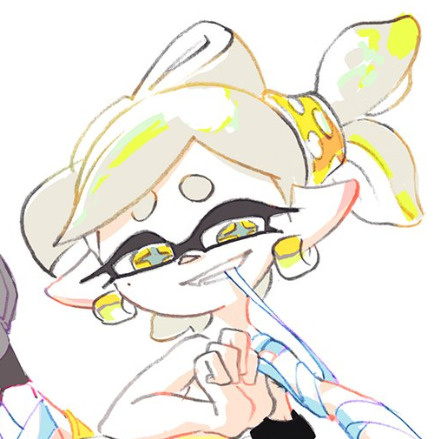
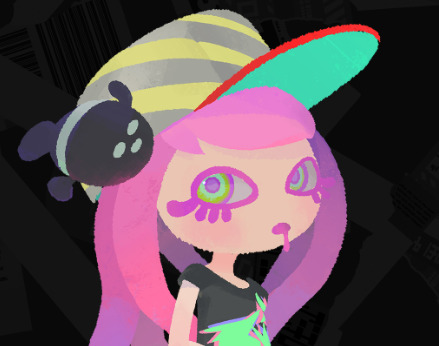
Harmony for instance is just.... a regular autistic girl, she isn't some incredibly smart girl, no, she's just a regular girl who speaks in a blunt and neutral way but that's about it. As someone who is autistic i can relate somewhat to how she speaks, in real life i tend to just say a few words when talking to someone and i don't really sound energetic or loud about it. i just go "Hey. Hi. Alright. Okay. Oh ok. Uh. I'm good." Some autistic people normally do not speak like they are the nerd emoji and sound hyper smart like Sheldon from Big Bang Theory, and they are not able to speak entirely. That's not what ALL autistic people sound like. There's a decent chunk of them that just speak regularly or speak a little quietly and thats okay. Harmony captures the speech of what a fair portion of autistic people talk like, but not every single autistic person of course. There is a large chunk of autistic people who need support when it comes to communication, and that's perfectly okay. They are just valid as human beings as the ones who can speak.
She also has an interest in music as she is the singer of Chirpy Chips and is seen stimming and fidgeting with an Ultra Hand. Autistic people usually fidget and stim to calm themselves down and keep their emotions in check, maybe Harmony plays with the Ultra Hand because it helps her stay calm when running Hotlantis.
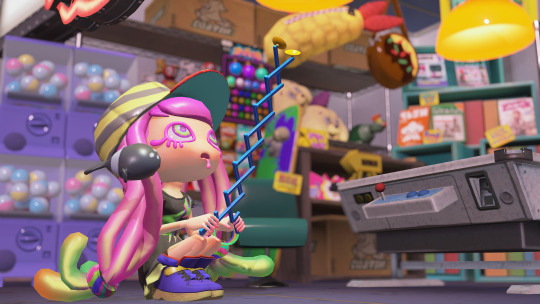
Now it's time to talk about the most popular example of autistic representation in Splatoon. Marina.

She is quite shy when you zoom in on her in Splatoon 2 when you play as an Inkling, but is known to ramble about machinery and excavators to Pearl and Acht for hours at a time. Technology and machinery seem to be a special interest for her as shown with her creating the Shifty Stations for Splatfests, having hacking abilities and building the Memverse. She gets so much energy and excitement from working on the Memverse as shown by her dialogue in the Dev Diaries. However she is not a flawless super genius like in most depictions of autistic characters, she is known to have uncontrollable emotional outbursts, when Pearl even suggests the idea of Off the Hook breaking up she becomes extremely devastated and thinks of the worst case scenario in her dialogue from the Chaos vs Order Splatfest. She sometimes can't control her anger and snaps at Pearl after losing multiple times in a row in Splatfests.
She also has issues with proper work life balance as she overworks herself with working on the Memverse alongside going on a world tour with Pearl, she vents abouts this in her 10th Dev Diary in Side Order. And speaking of order, she chose team order because she wanted to maintain the balance in her life that she has found. A lot of autistic people have strict routines and any changes to that routine will cause them to get really distressed. If someone comes into my space and says "hey we're going out in 10 minutes." I'm gonna get pissed off and be in a terrible mood as my routine has been disrupted and i wanna do something else. Routines give autistic people a lot of comfort and predictability.
Marina's deepest flaw she kept hidden was the desire of a perfect world of order where nothing can change because she's so scared of her new life being destroyed, but she learns to overcome this fear of change with the help of Pearl by the end of Side Order which may inspire autistic people to learn to be more okay with change, even if its very hard.
Marina is also seen wearing her headphones quite often and rarely takes them off which may indicate she might have sensory issues. Some autistic people may suffer with sensory issues and need to wear headphones or certain pieces of clothing to stay calm and keep their emotions from becoming too much. I tend to wear headphones often because i hate my ears being exposed and I'm very sensitive to certain noises.
She also may have another special interest which may be the Squid Sisters as she litters her laptop and keytar with Squid Sister stickers. Marina also talks in a very excited tone when you get Marie's and Callie's palettes in Side Order. She also acts very giddy and excited during live performances with them and starts stimming which is shown by her moving around in place and clamping her hands together.

Another character who you might not think is autistic right away but shows signs of it is Marie. And to be honest i find her to be very relatable.
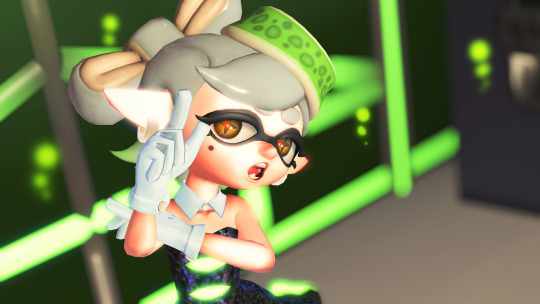
Marie is known to be more quiet than her cousin and she acted like this since she was a child. Marie also seems to struggle with social situations and struggles to talk with Agent 4 and Neo Agent 3 and wishes they can just leave her alone when you keep talking to her. However she seems to be a lot more comfortable talking with people she trusts and loves like her cousin Callie. She also makes quite snarky and sometimes rude comments but that doesn't mean she's a rude person, she just likes being cheeky and truly cares about the people around her. She even self loathes and worries about her cousin to an unhealthy degree.
A lot of people tend to say that autistic people have low empathy when in reality some autistic people are far from the case. Some autistic people might be TOO empathetic but they cannot show it because it's just so much for them that they can't properly express it. Marie may appear as rude and non caring but she's genuinely a very caring and emotional person but she doesn't know how to show it due to not having developed communication skills compared to neurotypical people. A fair amount of autistic people are not shy people that don't care about you, they just have a different way of speech and communication. 2 autistic people can talk vastly different from each other. It is a spectrum after all. There are some who may have low empathy, but they are not psychopaths who don't care about human life. It's really, really weird to think that and kind of damaging to see autistic people in that kind of light.
Marie is also known to be a picky eater and despises vegetables, refuses to eat the ends of bread loafs, hates tomatoes and pineapple on pizza. (she's literally me holy shit...) some autistic people can have sensory issues when it comes to certain textures and smells and vegetables usually have a weird texture compared to meats and other food groups. They can be seen as "picky eaters" that don't wanna try anything but, some autistic people genuinely cannot eat certain foods and may get sick in the stomach if they see that food and would rather eat anything else. You cannot get me to eat carrots, like I'm sorry but that's not happening buddy. I don't care if they are baked or boiled, i refuse to put that shit in my mouth.
She was also on team order like Marina as she likes to keep things nice and tidy like with most autistic people. Not all but most.
A little tidbit i wanna add as well is that since Splatoon 2, Marie has been seen holding an parasol and for seemingly no reason. Some may say she holds it to seem more professional, however i think she has it around because she likes to hold it in her hands and use it to fidget with, much like Harmony with the Ultra Hand. You can see her spin it around when you stay around her for a little bit in Splatoon 3's story mode. Although I might be looking too deeply into this but i think it might be a cute little detail.
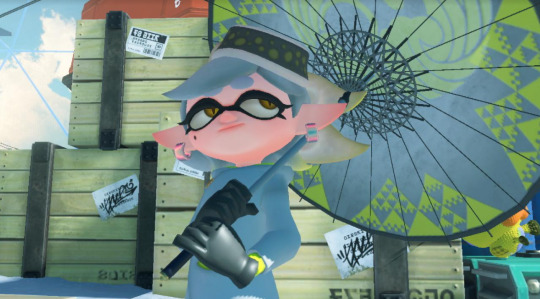
I find it really fantastic that Splatoon not only has good representations of autism, but it's also pretty diverse and shows different elements of the spectrum. Not every single aspect of the spectrum as there isn't an example of a high needs autistic character in Splatoon that I can think of unfortunately, but if you can think of a character who may be in the high needs category of the spectrum then let me know, however we got a pale skinny sea anemone who runs a general store and uses an Ultra Hand to fidget with, a tall black woman who's extremely passionate about machinery and technology, and a Japanese squid woman who would rather eat a Splattershot than a tomato. (Callie and Marie are based off of Japanese culture, look at their clothing and styles of music. If they were humans they would not be white women, sorry to break it to you bud.)
Before this ends i wanna say, if you disagree with me then that's fine. I get it. They aren't canonically confirmed to be on the autism spectrum and a lot of this is just speculation and observation. However don't be a fucking dick about it okay? Don't say that i don't know anything about autism and that I'm crazy and dumb. Don't do that shit. Seriously. I am allowed to look deeper into these characters and find relatability and comfort in them. Don't try to make me feel like a freak for this.
Anyways if i did get something wrong about autism let me know in a fair and polite way. I am human and I'm gonna make mistakes, but don't be a dickhead about it, k? Good. Have a goodnight or good day wherever you live.
#splatoon#splatoon 3#harmony#splatoon marina#marina ida#marie cuttlefish#marie splatoon#autism#neurodiversity#chirpy chips#pearl houzuki#pearl splatoon#callie cuttlefish#callie splatoon#rambles#text post#long post
1K notes
·
View notes
Note
most of the autism stuff i encounter (as a low-support autistic person) revolves pretty much exclusively around ppl with low-support needs, who can easily pass for non-autistic, who don't get diagnosed until well into adulthood bc they look "normal," which maps pretty well onto my own experience (except i was diagnosed very young) but it only represents a fraction of the autistic community. so your blog was a really nice find.
a few questions:
when your aac device runs out of battery, what are your alternatives? are you able to write stuff down instead?
what's the purpose of plaintext? who does it accommodate?
i know when it comes to individuals, you're supposed to ask them whether they prefer to be called nonspeaking or nonverbal, but which do i use as an umbrella term? how do i refer to them as a group? (maybe this is a pointless question bc you're only one person but i'm still curious)
sorry if i misspoke or said anything offensive, like i said i've been inundated with mostly low-support perspectives and today was basically my first time finding anything else
Hello anon! Glad to see you here. I’ll try my best to answer your questions.
If my AAC battery runs out, then I can use my phone. I have my apps on my phone as well for backup. But let’s say my phone and AAC are out of battery, I’d use my partners/caregivers phone, which they have a AAC app downloaded on and the notes app, which I could use to communicate. But let’s say my AAC is dead, my phones dead, and I’m not with my caregiver or my caregivers phone is dead. I’d be shit out on luck. Unless we had a pen and paper with us, I wouldn’t be able to communicate at all besides grunts, pointing, and leading. So yeah, those are very important. It’s very important to have things charged at all times.
Plaintext is important for those with cognitive and intellectual disability. Why? Because some of us can’t understand complicated text. I am one of those people. Some of it I can understand? But a lot of it I can’t. Plaintext is very important and is an accessibility tool. This just doesn’t stop at cognitive and intellectually disabled folk. Many people benefit from plaintext.
This is a hard one, and one I cannot not fully answer because each person will say something different. If someone was to use an umbrella term around me personally, I’d prefer them to use nonverbal. But some people prefer that people use nonspeaking. Again, it all depends and it’s a hard question. Just go with the flow and see what those around you prefer.
Anyways, I hope this helps! If you have any further questions then let me know. Have a lovely day anon!
#zebrambles#autism#actually autism#actually autistic#intellectual disability#aac#aac user#actually nonverbal#asks and answers#thanks for the ask anon!#thanks for the anon
210 notes
·
View notes
Text
Personally, I prefer not to use labels. But I'm fine with others using it for themselves and stuff.
Edit: Yk after some thinking I feel like yeah things like support labels are deffo useful when they are not being used to put some people's needs below others - that was the main reason why I didn't like it, but I think if used well instead of as "well you're low-support so you should be able to do that", they are actually good tools.
255 notes
·
View notes
Text
There is a real problem with lateral ableism in the autistic community. Low support needs people are so hard on those with higher support needs. Or to just say autistic people with certain skills are awful to other autistic people without those same skills. I'm not going to use names to avoid sending hate to anyone but recently someone who was diagnosed as a toddler posted a video of them happy stimming while watching Bluey. Many comments were like "I'm autistic and this is faking." "I'm autistic and this is why people call us the r-slur." "I'm autistic and this is why autistic people will continue to be abused for the next 20 years." (General "you" here) Being autistic doesn't erase the ableism from these statements. Our ableist society taught you to be uncomfortable with obvious autistic behavior, it was likely trained out of you. So when you see someone who can't mask or at least can't mask as well as you are uncomfortable. It is still ableism; ableism that was ingrained into you. I've recently seen autistic people shamed for complaining about New Year's Eve fireworks (while wearing ear defenders so it wasn't like they didn't try anything), not using the right "tone" or words coming off wrong because they are literal speakers and it happened from other autistic people. Like you think there be some understanding. But it's like "I overcame that problem so you should too." Ignoring it's a spectrum and yeah it's likely a bigger struggle for them than it was for you. Look at first glance, people aren't going to guess I'm autistic. I somewhat pass for NT and I have a certain amount of privilege there. But I'm not going to tell the person who is incontinent that they are "making autistic people look bad." No, ableists need to stop looking down on needing help for a disability.
347 notes
·
View notes
Text
yall, its finally happening ... getting my tits shot off is simply so within my grasp 😭
i'm getting top surgery on january 8th 2024 and im so excited and so scared but im being so so brave about it
though i've tried saving the funds myself for years now, emergencies keep wiping them away, like vet bills, emergency moves, wage theft, a con artist roommate, you name it, its happened in the last two years. i never wanted to have to rely on crowdfunding for something so vital and important to me, but now that it's here im really calling on my community to help support me
top surgery is not only a dream come true as far as having a body i can finally call home, but also with living in one of the most conservative states in the bible belt as a trans, gay, autistic, disabled, jewish man, its a matter of safety as well. temperatures frequently reach 115f/46c in the summer here, and with some of my health problems, binding isnt always feasible in that kind of heat. but not binding also means i risk getting clocked, and i don't think i need to tell yall how bad that could go for me
i've really been scraping by on low wages for years as a social worker and now as a graduate teaching assistant. and the previously aforementioned vet bills, con artists, etc have just really squashed any hope i had for paying for this myself
it's not easy for me to ask for help, but it would genuinely mean the world if yall could share this around. i know this is the webbed site of unemployed disabled people and broke college students but every little bit helps
if not for me then please do it for my nanny, a 10 year old pit bull who simply loves to step directly on my tits and would really appreciate if i didnt weep and wail every time she did it
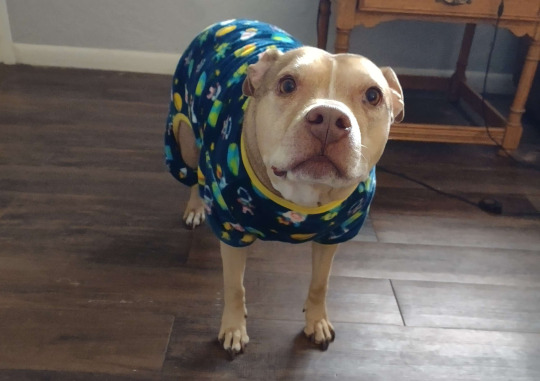
[ID: a photo of a tan pit bull wearing blue spaced-themed pajamas.]
godspeed little gay people in my phone and thank you!!
325 notes
·
View notes
Text
as an autistic trans man, sometimes I feel less safe in public presenting as a man than as a woman, because, especially in certain places, man + visibly autistic tends to be more often falsely read as "dangerous and predatory" than when people read me as a woman.
Yeah, as an autistic trans woman who doesn't pass, I feel that. <3
Honestly thank you so much for what you do on this app. I'm so glad there's people who are actually willing to stand with trans men instead of pulling the "um well I have it worse so do NOT talk about your own oppression EVER or else you're a transmisogynist!" I'm so happy I found your blog and I hope you have a great week <3
I hope you have a great week as well!
Eh a long while ago Chris Fleming made a video making fun of polyamorous people which used a lot of the same hurtful stereotypes society already perpetuates against us and I’ve not paid attention since
Noted, as someone who is also poly.
i wish the queer community didnt put so much emphasis on sexuality labels like i just want to have sex why do i need to put a word to it
very valid
about the dropout “discourse”: hot take but real life people are not representation. theyre people. real people are not queerbaiting you and real people happening to not be transfem (and I have literally seen transfems in some dropout episodes theyre just not part of the main cast) is not a lack of representation. these are real people. stop* *not you, the people being shitty about it
the complaint is not in any way coming from a genuine place tbh
hey! i just wanted to let you know how much your blog means to me as a trans guy. you and your reblogs have given me hope at trans unity, and lets me know that i-- that we-- aren't alone. so thank you for everything you do, and i greatly appreciate your support and look up to you 💛
Thank you. <3
i redownloaded etsy recently and seeing all the trans stuff saved to my favorites is so sad. i used to feel happy and proud and i wanted to be open about being transmasc. but since all the discourse got worse i just. cant bring myself to feel like it matters. it makes me feel like im trans and yet i will never matter the way other trans people do.
You do matter anon, I promise. I love you, you matter, and I'm glad you're here.
As a trans guy a lot of the self-ID'd TME transmascs weird me out so much. Like why do they all sound like "I am so strong and my power to Harm Women is immense. I could do it so much and I feel the pull to the Transmisogynist Dark Side but *unsheaths sword* I will protect them instead with my big strong testosterone arms from my fellow men" like what even is that. Who is into this.
it's so incredibly obviously bad but it reinforces some people's victim complexes so it's praxis now
a trans person will joke about their experience and a trf will jump in to assume theyre a white transmasc who has never ever faced any real difficulties for being trans
every time
Out of the many, many stupid ideas in this dumb discourse, I've finally decided the one I hate the most is that underlying implication that transmascs just aren't trans enough. It's so gross seeing people imply that we aren't really trans. Our dysphoria is minimal discomfort at most, apparently. I've seen people post about and imply that transmascs will never understand not feeling like a person or being unable to live a life pre transition and that's why we have privilege, i guess - are you kidding me? It's like our experiences are a joke to these people who are clearly so wrapped up in their online discourse bubble that they're just detached from what it's like for trans people as a whole. Sorry for the vent (would rather not post this on main and I don't have anyone to talk to) but it's just the most grating part. Also it's like. Low-key transmed shit. Thought we left that behind, c'mon.
transmeds are like ants they come back every summer
i wish TRFs had a label they proudly called themselves so i could jsut go through their tags and block them, but noooooo they HAVE to frame their transphobic bullshit as Brilliant Transfeminist Theory. like atleast radfems are fucking honest about being radfems
That's part of why I made antigonism a label for anti-TRFs to call themselves~!
32 notes
·
View notes
Note
Feel free not to answer this question as it's more a research-type question, I'm just not sure how to go about finding what I need: do you happen to know any fiction books with portrayals of medium to high support autistic people that are considered realistic and positive? All I can find is rep of low support autistic ppl (unless it's in semi-educational children's books) and it's making it harder to figure out how to write medium to high support autistic ppl myself.
Hello!
When I was diagnosed, it was before the levels were used (Or at least before they were used where I lived). I suspect that I would be considered 'level one autistic' today but would likely have been 'level two', bridging into 'level three' as a child. This is all just to explain my perspective with this.
That being said, here are some of my recommendations:
A Step Toward Falling by Cammie McGovern
I just finished this book earlier today and while it isn't specifically about autistic characters, it does feature several autistic characters with high support needs as well as other disabled characters. The book is written from the perspective of two characters, one of which is developmentally disabled (Belinda). Although her disability is never specified, I do see a lot of autistic traits in Belinda. The premise of this book is a bit heavy. It's about two characters (Who are not disabled) who end up volunteering at a centre for adults with developmental disabilities. One of the things I appreciated about this book was how well rounded the characters are. Each of them has their own stories, interests, and ideas. I also like how it discussed sex and relationships in the context of people with developmental disabilities. Something to note is that this does have some sensitive topics such as ableism, sexual assault, and bullying. It is also written by a parent of an autistic child but, as far as I'm aware, the author herself is abled. I did have some conflicted feelings about specific parts of it but I'll leave that for you to make your own decisions about. Target Audience: Young Adult
How to Speak Dolphin by Ginny Rorby
I also read this book recently and I personally really disliked it. There were several scenes that made me feel very gross and I found that the autistic character was dehumanized very often. One line that stuck with me was another character about a blind character, essentially saying, "I thought she was going to drown herself. If I was blind, that's what I would do." Although the character does get to know the blind character and changes her mind, it really felt awful to read and seemed so unnecessary -- especially given the target audience. The way it talks about blindness in general bugs me. That being said, I have seen several autistic people recommending the book (Which was why I read it in the first place) so I'll include it here anyways since my opinion seems to be in the minority around this book. Target Audience: Elementary/Middle Schoolers This is a brief review from another autistic person. [Link]
Planet Earth is Blue by Nicole Panteleakos
This book centers around Nova, a young autistic girl with high support needs. Nova is a foster child who is missing her older sister and the story is told through a mix of narrative, letters to Nova's sister, and flashbacks. It's been a while since I've read this book but I remember really enjoying it (And maybe crying a little bit too). The author is autistic herself and also consulted many other autistic people with a variety of experiences, which I appreciated. Target Audience: Middle Schoolers This is a more in-depth review on the book from a reader who (I believe) is also autistic. [Link]
These are also a couple books that I've seen recommended but can't personally recommend as I haven't read them myself yet:
Real by Carol Cujec
Remember Dippy by Shirley Reva Vernick
I know it's not very much but hopefully it's enough to get you started! If anyone has any recommendations for anon, feel free to mention them in the notes.
Cheers,
~ Mod Icarus
62 notes
·
View notes
Text
A bit of a hot take
I don't like it when people compare low support needs autistic characters to Music (the girl from Sia's infamous movie) who is meant to be a high support needs autistic character.
First let me clarify that I'm not defending Sia or that movie that she made, I do agree that it has a lot of issues and should not have ever been made.
However those "good" autism rep characters being either level 1/low support needs autistics (Abed from Community for example) or not canonaclly autistic but are viewed as autistic (Lilo from Lilo And Stitch for example) while labeling Music as the "bad" autism rep is a little unfair, because they aren't very comparable, it's like comparing a part time wheelchair user to a full time wheelchair user.
Not to mention the fact that there has been saying things like "no autistic person would eat gum off of a bench" when in fact, some autistic people espsecially level 3/high support needs people would as well as having meltdowns the way Music does or make "odd"/"funny" faces, I will say that the way Music is potrayed isn't good and is poorly written, however there are autistic people irl who do have the same traits as Music and therefore while probably not intentional, the people who are framing Music is the "bad" autism rep for having traits that level 3/High support needs autistics have as well is being ableist.
Overall what I can say is I think higher support needs autistics deserve much better rep than what they get and to be included.
#autism#neurodivergent#neurodiversity#high support needs#autism representation#autism spectrum disorder#autism in media#autism awareness#autism acceptance#representation
49 notes
·
View notes
Note
Hi, so i'm autistic, and i was wondering if others felt the same way about the label "high functioning" to describe having less needs than those who have more difficulties on the spectrum.
I personally don't like the term, as it's typically used to dismiss our needs, and has made headway for people after hearing i have "high functioning" autism to just say i'm using excuses, or i'm not actually autistic because i'm "high functioning" i also don't feel like i'm high functioning either, i feel very lost and confused about everything, and haven't been able to get the help i need because i'm so "high functioning" in others' eyes.
So yeah, do other people also dislike the term high-functioning? And would they be be willing to explain why they dislike it, or even why they don't dislike it?
Also, if you answer this, thank you very much, i'm often very confused and like hearing others' thoughts on things
Hi there,
I absolutely hate the term “high” and “low” functioning. Like…wtf does that even mean? How well you can function in society? That’s fucked to me.
There’s a level system now.
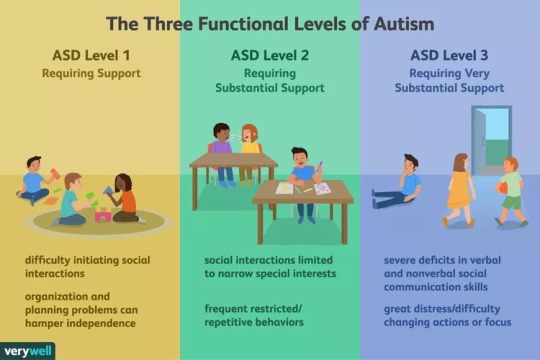
I have mixed feelings about the level system, but it’s so much better than those functioning labels.
My followers can provide their own opinions if they’d like.
I hope this helps answer your question. Thank you for the inbox. I hope you have a wonderful day/night. ♥️
70 notes
·
View notes
Note
i’m like 99% sure you can ask for advice here so here goes
so, basically i have a queerplatonic/platonic crush on my band president. AND I ABSOLUTELY DO NOT KNOW HOW I DEAL WITH IT. so, for some context we started talking last year because i just joined the school and the bad and we started talking around mid-year and we weren’t that close orginally but there was this night we had a long, deep convo and after that we started to get really close. after two months, i started to have strong feelings for her (but not romantic) and i think it’s a platonic or queerplatonic crush and i didn’t really go to school and band that often for a while because of autoimmune disease and when i was there i tried not to make it seem like i’m too excited to see her which kinda makes me worried that she thinks i’m iggoring her but we text a lot so. anyway, even though we usually don’t interact irl that much [:(] we still do sometimes, and whenever my score has a rest i always look at her. especially when she has a solo. one time we went to experience this colleg band thing and i asked for a hug and she accepted❤️ i wanna hug her again. i do kinda wanna get touchy with her but not TOO MUCH, y’know? besides, i’m shy/nervous around her and anyway, she’s alloromantic. but anyway, today during our cca fair we kind of kept on kinda locking eyes (accidentally?? idk. but i know i was doing it on purpose) and it made my aromantic heart flutter
anyways so i don’t know what to do should i say i have a platonic/qpr crush on her? though i can’t tell which one it is…..
uhhhhh so, as a nonpartnering sort, I think I'm gonna give some general advice, and leave the specifics to the crowd.
broadly: do you know her views on queer stuff? could you casually bring up "oh, I was reading a queer story --", or if you know she's queer-friendly, "oh, out of curiosity, how many of the flags do you know?" type of stuff? Just, get a general vibe of her views of 1) queer people, 2) what she does and doesn't know or think she knows, and 3) if she knows about aromanticism, what she thinks it is and how she feels about aro folks.
I like to start there personally, because it gives you a lot better of a place to start a conversation about your own identity if you have a common ground on what feelings and definitions are being used. It's really easy, I find, for someone to confidently state they know what something is / what you mean, and be totally off base to the point that you're having totally separate conversations and don't even know it.
To use an example: in high school I had a friend who... lovingly, he grew up rich and sheltered, and probably only was not diagnosed as autistic because he was low support needs. His social skills were, lovingly again, as well informed as he could make them, but executed like a train wreck that most everyone attributed to "boy genius is a little weird". (He was, simultaneously, the heart throb of our school, and a lot of guys realized some queerness because of him, but that's a whole other funny story)
He was super nice about me coming out as trans, but clearly in a "he's confused but got the spirit" way. No idea what I meant, but he knew it meant a lot to me. A few weeks after that, he quietly admitted, "I thought it was about like, gender roles like cooking and cleaning and stuff, and I'm starting to get the impression I might not be right about that."
...
So, I now recommend everyone start with "let's get on the same page about what things mean" before having any big identity chats lol. It often leads to a quiet revelation on their side that you're guiding it to "Hi, I am that identity", but also puts it in a place where they're free to ask questions, and in my experience, treat it a little more thoughtfully and seriously than if it were a fly-by "heyyyyy i am aro and i am scared of this conversation, bye!" that can happen with enough anxiety. totally (/sarcasm) not speaking from experience.
hope that helps? from there, just... keep up communicating, leveling the knowledge field, and if a relationship is what you want, do the work. talk about what that means for you. ask what it means to her. talk about if that's compatible, and how conflicts might be navigated. if that goes well, congrats! if not, congrats! you've probably avoided the messier options, even if it isn't what you'd like.
24 notes
·
View notes
Text
My hottest take on disability media is that this film (as much as it deserved a good 90% of it's backlash; my GOD it was ableist, harmful, horribly written, horribly paced, and clearly not well thought-out) ...would NOT have been as poorly received had the titular character had low-support needs as opposed to high.
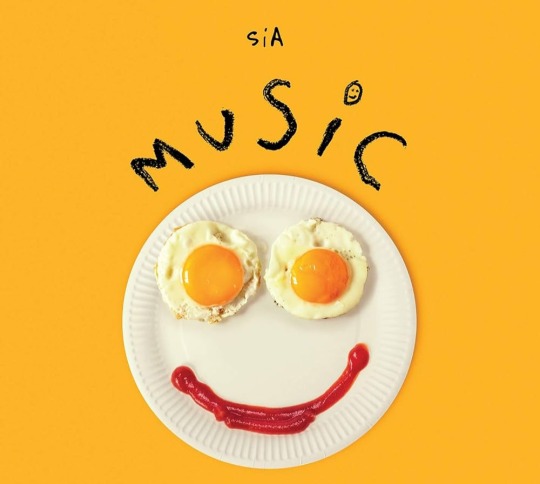
I'm serious. I saw that some of y'all's knee-jerk reactions were "AUTISTIC PEOPLE DON'T ACT LIKE THAT!" and "BUT I'M NOT LIKE THAT!" and... I mean? Yeah? She's one girl, she obviously can't represent the whole spectrum.
But I'm sick of this lateral ableism, "I'm-not-like-other-girls"-esque attitude some of us Autistics have towards the others. We learn to look down upon those who can't take care of themselves or get by in the world like we can; the ones who can't mask; the ones who are sometimes dealt the most abuse in life because they'll never have the privilege of being able to verbally speak up against it or live without a caretaker. Because what often happens is:
Autistic people who need a lot more support than we do wind up becoming allistics' Default Setting™️ idea of Autism.
Autistic people who are very different (usually more independent, sharper intellect and maybe inclined towards more mature[?] interests) then come into those allistic people's lives.
The allistics then begin to infantalize them the same way they infantalize the Default Setting™️ Autistic people around them, then refuse to listen when asked/begged to stop; denial of autonomy.
Instead of directing the VERY warranted disgust, anger and resentment towards the ableist allistic people doing this to us, we direct it towards the initial victims of this treatment; who, frankly, ALSO don't deserve to be treated like literal babies or burdens like that in the first place!
Instead of trying to find solidarity? In-fighting ensues.
I don't know, that's always irked me and it's been in my brain for like four years. Because think about how much we learned in a short period of time around the movie's release. The woman...
Forced a 14-year-old Allistic child to imitate a disabled person when she didn't want to;
TAUGHT her to do so via forcing her to watch meltdown videos filmed & posted by Autistic kids' parents (likely without the child's consent);
Dissed Autistic actresses online for no fucking reason, really.
Named a movie after a disabled child character who's treated more like a prop and isn't even centered in the film's story (and lowkey repeated the pattern twice, if you guys remember Felix's storyline. He was just shoved into this for like... sadness points?)
Teams up with the "most popular" Autism organization even though it has been VERY accessible and public knowledge for years that they've earned a pretty negative reputation for themselves.
Portrays unnecessary prone restraint as a GOOD thing.
...And has MULTIPLE instances of questionably racist undertones. Including within the first 5 seconds of the film.
And yet, some of y'all's priority was the fact that "I'm not like that! I'm FUNCTIONAL!"
...Yeah. Yikes.
Something tells me that Music would've gotten significantly less backlash had Maddie been made to portray somebody who could consistently speak verbally, stimmed in more subtle ways, and didn't have so many meltdowns.
We feel so much shame & discomfort at just sharing a diagnosis with somebody more disabled than ourselves that we will reject it (and them) the moment it happens, without a second thought. Because the thought of being treated by abled society as even more disabled than we are already terrifies us. Because we KNOW that disabled people as a whole are not treated well.
Hell, clearly Sia internalized something like that as well because she wound up being diagnosed as Autistic herself, and she WROTE the damn thing!
Yeah, I've... got a couple of words for all this. 😬
Assimilation. Trauma. Internalized ableism, even. Let's unpack that in 2025, please!
#hot take#autism#autism advocacy#autism speaks#sia#sia music film#music sia#discourse#anti ableism#ableism#lateral ableism#rant#disability#actually autistic#internalized ableism#some of yall disappoint me & center yourselves a little too much#yikes
25 notes
·
View notes
Note
hi! hope you're having a good day! i would like to ask a question. it's something you've talked about before, i'm pretty sure. but what do you think or feel when people say, "visibly autistic doesn't exist?" i saw a post on reddit talking about how you can't be visibly autistic, and it ticked me off. i myself am not quite visibly autistic (i am low support needs, probably level one but no official diagnosed level), and i would like to hear from someone who has higher support needs than i. of course, absolutely no pressure to answer! you are not obligated to talk about this at all. thanks for your time!
Hi anon! I think this is a very important topic and I’ve talked about it in the past as well.
Honestly, it pisses me off. Because it ignores a HUGE population of autistic people. A lot more autistic people are higher support needs than people think. I think it was said that 26% of autistic people have “severe” autism? Or around that number. Although that doesn’t include those with medium support needs, and the likes.
When people are saying that “autism is invisible” they’re ignoring people like my friends and me. They’re ignoring those of us who do look autistic, who do need care in everyday life, who are visibly autistic. And it pisses me off when people say it. It’s 100% ignorance. Ignorance towards those who are higher support needs and low masking. And even those who ARE lower support needs and low masking, which is a thing.
Low masking autism, visible autism, is a thing. And people love to acknowledge it until it doesn’t fit their quirky idea of autism. Until it doesn’t fit the silly hand flapping and being “quirky”. When it doesn’t fit that, when it involves violent meltdowns, needing help using the bathroom, needing help every single day with “basic” things, suddenly it doesn’t exist to them. It isn’t possibly autism, it’s something else. It’s intellectual disability, it’s this, it’s that, it just isn’t autism. It can’t possibly be autism, right? /sarcasm
It annoys me so much, and I think more people need to talk to higher support needs, low masking individuals. They need to talk to them. They need to expand their social media coverage and friend groups. They need to see these things and believe it, because autistic people are here, and they’re visibly autistic. One autistic person isn’t going to look the same, they’re going to have different needs, but that doesn’t mean that autism doesn’t have a look for some.
52 notes
·
View notes
Text
Hi, and welcome to autism-culture-is! I was informed that the other autistic culture blog was inactive, so I figured hey, why not give this a go! :]
You probably already know the drill with culture blogs, just send an ask starting with "autistic culture is" and then I'll post it.
There's only one mod, you can just call me Mod A, A not standing for autism but it works out well. He/it pronouns. I'm an adult.
Few things to put out there:
Ableism of any kind will not be tolerated here. Obviously no ableism against autistic people and other neurodiversity, but also no ableism against more stigmatized mental illnesses like personality disorders or psychosis, ableism against intellectual disabilities, or ableism against physical disabilities.
Other types of bigotry also get the boot, racism, sexism, homophobia, transphobia, classism, fatphobia, antisemitism. Also no exclusionist crap.
Don't send in asks about "going nonverbal" or "going semiverbal", those terms are meant to describe permanent states and people who are always nonverbal or semiverbal are against using these terms to describe temporary states. Use terms like speech loss or verbal crash instead.
Autism isn't fundamentally different based on gender or sex, so please avoid terms like "male/female autism" or "amab/afab autism".
Please don't use the word cr*ppling, as it's a slur against physically disabled people. Say debilitating instead for things like "debilitating anxiety".
If you send an ask with media, please put an image description with if you're able to. If you're not, I'll give it one, but it's easier for me if the asker gives the image description.
Please let me know if there's anything that I should be doing better regarding disability stuff. I'm level 1 autistic, verbal, and with low support needs, so I may not always be aware of certain issues.
That's all for now! Happy autisming!
241 notes
·
View notes
Text
why do people think endogenic systems aren't real?
disclaimer: i am not a system nor am i part of one, and i am not able to speak for those who are. this is an opinion, and i would like constructive feedback on said opinion. i do not want hate mail or people screaming at me, i have had enough of that this week.
i do not get why people think endogenic systems aren't real. the argument i see most is that if it's not based on trauma (i.e. traumagenic) then it's not real, but i disagree.
firstly, many mental conditions can arise from non-traumatic experiences, and trauma is not a necessary catalyst for these things. i'm autistic, though i can't speak for others (because my support needs are very low) as a result of how i was raised, but not in a traumatic way. i've asked around a bit about this, and it seems that part can be agreed upon, in that mental conditions do not have to result from trauma.
secondly, i have not noticed any differences, aside from trauma or lack thereof, when speaking to those who are a system or part of a system. i cannot know what is going on in other people's heads, but i can look at how people generally act, and i do not notice any difference, though the sample size is low (about 5) so this could be coincidence. i might ask in passing conversation, "how does being a system work?" out of curiosity. they explain, and the explanations from traumagenic and endogenic systems, or members of said systems, are fairly uniform and don't seem to contrast very much, aside from individual mannerisms such as how it may present itself, which is bound to be subjective for any mental condition.
thirdly, i don't like the logic the argument as a whole operates on. if non-traumagenic systems aren't real, isn't that similar to the argument wherein people say non-dysphoric trans people aren't real, or that self-diagnosed neurodivergencies (e.g. autism, adhd, bpd, tourette's, dyslexia, and others as well, but i can't list a ton of them off the top of my head) aren't real. this is medical essentialist, or medicalist, logic, and it doesn't hold up very well under pressure. it frequently takes the form of when someone doesn't want to acknowledge that not everyone is like them, and most commonly presents itself in those who are bigoted in other ways, such as racism.
fourthly, when conversing about it, the reactions i get from either type of person are very different (sample size of about 40 here, so again, it's not entirely conclusive) if i ask someone who's anti-endogenic about it (what the point of the argument is, for instance), i am met with hostility and yelling, whilst if i ask someone who is pro-endogenic about it, i am met with straightforward explanations and my questions being answered. ultimately, it isn't one's duty to answer questions for others, but if one side of a debate refuses to answer questions and another is able to answer questions, then typically, the side refusing to answer questions is wrong. for example, flat-earthers will refuse to argue a lot of the time, and other times, they will mention various buzzphrases such as "water finds its level," and "density and buoyancy," which is a phenomenon i have noticed coming from some (but few) anti-endogenics.
that's what i've gathered from my observations, and i wanted to share this for the reason that i want to understand more, and particularly why some people think the things they do - in that they don't believe a particular group of people exists. to cap it off, i'll attach a poll below, asking what people think regarding this.
if you want to help the poll get more entries, then you can reblog this post or share it with friends. thank you for reading!
83 notes
·
View notes